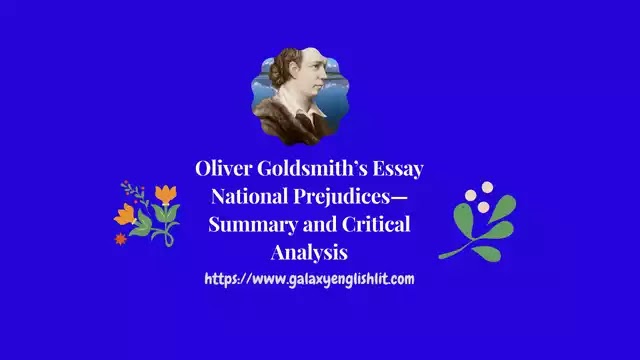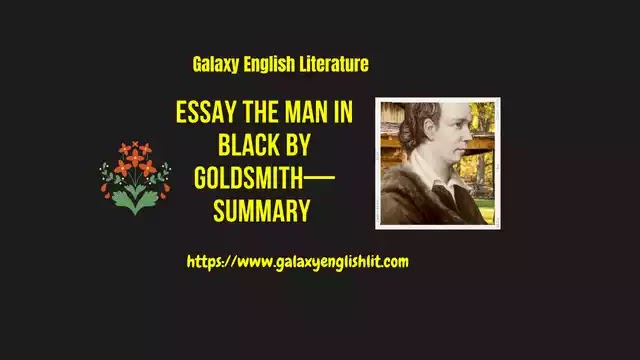Introduction:
The virtues of Larkin's poetry are clarity and elegance. He has a reliable instinct for orderly arrangement and a respect for formal perfection. He makes the most of his gifts and has an accurate sense of his limitations. His skilful craftsmanship enables him to build up a firm structure in his poems and to portray the realistic details of the contemporary scene in a language that has a recognizable rhythm and a consistent polish. In poetry that fits naturally into rhymed and obviously metrical verse and which inherits the traditional virtues of poetry as a medium of artistic expression, he takes a thoughtful look at England as it really is and on human situation as it exists around him. He conveys rhythm by calculated metrical irregularity. He mixes formality and informality, severity and charm, humour and pathos, making the product conservative and inimitably new. Larkin never uses free verse. He writes in traditional rhythms, metres, rhymes and syntax because his concern is to celebrate traditional feelings.
 |
| Philip Larkin's Skilful Craftsmanship— poetic style |
His Realistic Approach:
Larkin believes that poetry is the only means of being honest by transfiguring into words exactly what he feels deeply and by registering his authentic response to experience. His poem Deceptions is the realistic portrayal of the miserable plight of a poor raped girl and of the callous indifference of the passers - by to her condition which reflects truly the sorry state of affairs obtaining in metropolitan and urban areas. Posterity unmasks the deplorable charlatanism of a self - aggrandizing young American University teacher who, in utter disregard to the pursuit of knowledge, is engrossed in securing a Ph.D. to stabilize his pedagogic. His satiric observation applies to all academicians with universal validity. Larkin's poem entitled Next Please unfolds the cruel reality of human existence with the cheerful prospect of a plethora of hopes promising to reach their fruition but suddenly getting belighted and the only appalling reality that counts is the discovery of the fact that death is approaching slowly but surely.
The Use of Symbols, Images, Metaphors and Similes:
Larkin culls his images and symbols from diverse sources like Nature, time, sex, death and personal experiences in order to build an atmosphere or to heighten the poetic effect with their thematic relevance and functional character. The scrutiny of Coming leads us naturally to the consideration of nature image in Larkin's poetry. In Trees, Larkin imbues Nature with a moralising power. The greenery of Nature does not promise eternal youth or revival on man's part but reminds him of the futility of his emulation of Nature. The image of ‘Trees’ has ambivalent significance implying man's hope and the concomitant despair that sours it. Larkin's preoccupation with time highlights its destructive nature. In Triple Time, he seems to lament how we missed many opportunities. In An Arundel Tomb, the images of snow, light and “a litter of bird – calls” denote the passing of time. Larkin uses symbols to express his abstract ideas. Some of his poems are very good examples of symbolist poetry. For example in Water, Days, Church Going, Toads, he uses symbols which clearly express his abstract ideas to the themes of work, religion, alienation, loneliness and death. This he has achieved through the use of similes and metaphors. For instance in the poem Deception, there is a remarkable use of similes:
“All the unhurried day.
Your mind by open like a drawer of knives.”
The whole poem Next Please is an extended metaphor.
Formal Sublime Dignity:
An eighteenth century poet tends dignity to his experience by clothing in words derived from Greek and Latin, but Larkin achieves the same kind of dignity by using single Anglo - Saxon words, and herein lies his originality. His style achieves a formally sublime dignity as in the final stanza of the poem “Church Going”:
“A serious house on serious earth it is,
In whose blent air all our compulsions meet
Are recognised and robed as destinies.”
The syntax at the end of Ambulances has an intricacy achieved by the poet being formal:
“The traffic parts to let go by
Brings closer what is left to come,
And dulls to distance all we are.”
Simplicity of Diction and Colloquial Language:
Larkin's language poses no problem to the reader on account of its lucidity and simplicity, though the ideas expressed are complex or paradoxical at times as in the case of Next Please. His diction covers a wide range from the slangy to the stately, from the crudely vernacular and the conversational to the formally dignified. Larkin proves himself an unsurpassed master in the slangy and the colloquial. He galvanizes poetry, enlivening it with slang like ‘kiddies’. ‘stewed’. Toads, Wild Oats, Send No Money and Self's the Man are animated by the vigour of “persky street - flavoured simplicity of the language”. Larkin seems to subscribe to Eliot's theory that good poetry must have the virtue good prose. He has incorporated the prose virtues of simplicity, naturalness and humour in a carefully written piece of verse like Poetry of Departures.
Lyrical Quality of Larkin's Poetry:
Larkin has imbibed the lyrical quality from W. B. Yeats and Dylan Thomas. His peculiar genius lies in his ability to extract beauty from the sterile and the uncompromising. A scholar eulogises the lyricism of Coming and refers to it as the most delicate expression of Larkin's rare ‘epipharies’. Lyricism is etched in Wild Oats:
“About twenty years ago
Two girls came in where I worked.
A bosomy English rose
And her friend inspects I could talk to.”
Wide Range of Metrical Devices:
Larkin has written quatrains, couplets, tercets, six lines stanzas and seven lines stanzas. He has used ten lines stanzas in the poem Faith Healing. In the poem Whitsun Weddings he has used nine lines stanza. In Next Please, he uses pentameter quatrains made up of two couplets. In Toads, the lines alternate in tripling rhythm of trimeters and diameters; the rhythms are slant (with / louts). Roads Revisited is calmer than Toads with its off - rhymed couplets and the poem shows the mastery of his metrical spacing. The rhyming in A Study of Reading Habits is a superb at the technical level. The poem Water is an unrhymed poem written in a ‘stress accent rhythm’. The poem Reasons for Attendance is composed of the rhythms of the ten syllable iambic line. Its technical control is emphasised by the last two words. ‘Or lied’, which seem to stand isolated. They do not form a grammatical sentence but a special rhythmical stress is placed on them by the full stop before ‘Or ‘. Again his craftsmanship comes to the fore in the way he is building the effect leading to the maxim of the last line in An Arundel Tomb.





